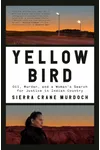Picture an American storyteller who turned a gritty true-crime tale into a profound exploration of justice and identity—meet Sierra Crane Murdoch! This acclaimed journalist and essayist has carved a niche in the literary world with her vivid narratives about the American West. Her Pulitzer Prize-finalist book, Yellow Bird: Oil, Murder, and a Woman’s Search for Justice in Indian Country, showcases her knack for blending suspense with social commentary, making readers rethink the world around them.
With a voice that’s both empathetic and incisive, Murdoch invites us into overlooked communities, weaving stories that resonate long after the last page. Let’s dive into her journey, from her roots to her rise as a literary star!
The Making of Sierra Crane Murdoch
Born and raised in rural New York, Sierra Crane Murdoch developed an early love for storytelling. She honed her craft at Middlebury College in Vermont, where her passion for writing and environmental issues took shape. After graduating, she moved West in 2011, eventually settling in Oregon. Her early career as a journalist saw her tackling stories of natural resource extraction and its impact on communities, laying the groundwork for her distinctive voice. Fellowships from Middlebury and UC Berkeley’s Investigative Reporting Program sharpened her skills, setting her on a path to illuminate the American West’s complexities.
Sierra Crane Murdoch’s Unforgettable Stories
Murdoch’s breakout work, Yellow Bird, published in 2020, is a masterclass in narrative journalism. This gripping book follows Lissa Yellow Bird, an Arikara woman on North Dakota’s Fort Berthold Indian Reservation, as she investigates a missing oil worker’s case. Blending true crime with social critique, Murdoch spent eight years reporting on the oil boom’s impact on the Mandan Hidatsa Arikara Nation, crafting a story that’s both a page-turner and a meditation on trauma and redemption. Critics, including The New York Times and NPR, named it a best book of 2020, and it earned an Oregon Book Award.
Her second book, Imaginary Brightness: An Autobiography of American Guilt, dives deeper into societal issues, showcasing her ability to merge personal and cultural narratives. Murdoch’s essays and articles, featured in Harper’s, The Atlantic, The New Yorker online, and This American Life, explore themes of environmental justice, indigenous rights, and human resilience. Her style—rich, immersive, and conversational—invites readers to engage with complex topics, making her work both accessible and thought-provoking.
Whether she’s unraveling a murder mystery or reflecting on intergenerational trauma, Murdoch’s writing stands out for its depth and empathy. She doesn’t just tell stories; she sparks dialogue, encouraging readers to see the world through new lenses.
Why Sierra Crane Murdoch Matters
Sierra Crane Murdoch’s work has reshaped how we understand the American West, particularly its indigenous communities. By centering voices like Lissa Yellow Bird’s, she highlights the resilience and complexity of marginalized groups, challenging stereotypes and sparking meaningful conversations. Her role as the 2023 Kittredge Distinguished Visiting Writer at the University of Montana and her teaching stints at UC Berkeley and Middlebury underscore her influence as an educator and mentor. Murdoch’s storytelling bridges journalism and literature, making her a vital voice in contemporary nonfiction.
Her ability to weave environmental, social, and personal narratives has earned her a devoted readership and critical acclaim. As her work, like Yellow Bird, is adapted for TV, her impact continues to grow, inspiring new generations to explore the power of storytelling.
About Sierra Crane Murdoch
- Key Work: Yellow Bird: Oil, Murder, and a Woman’s Search for Justice in Indian Country (2020)
- Awards: Pulitzer Prize finalist, Oregon Book Award winner
- Notable Publications: Harper’s, The Atlantic, The New Yorker online
- Fellowships: MacDowell Fellow, Middlebury College, UC Berkeley
Snag Yellow Bird or dive into Murdoch’s essays for a thrilling, thought-provoking ride through the American West’s heart and soul!
